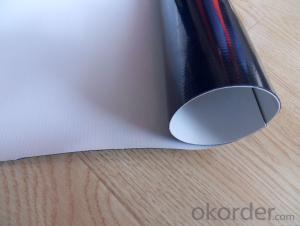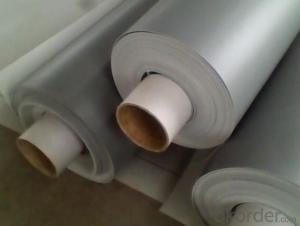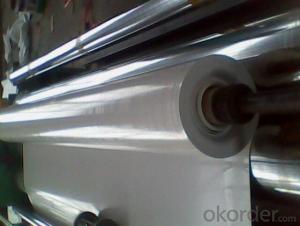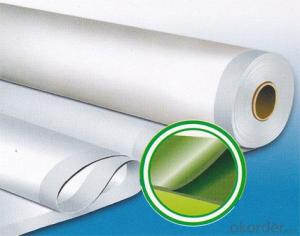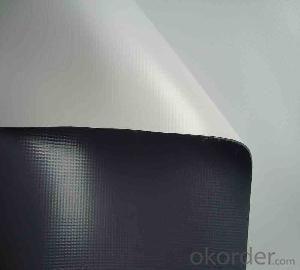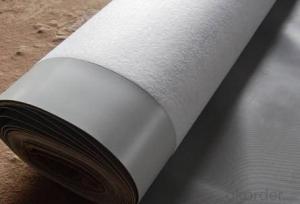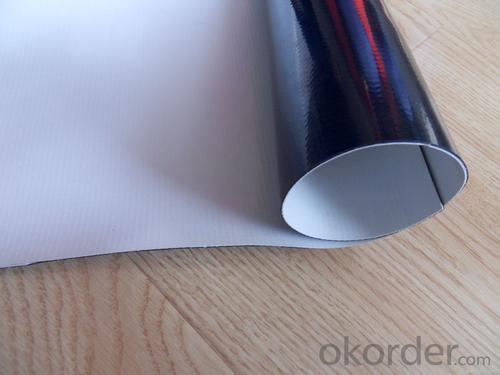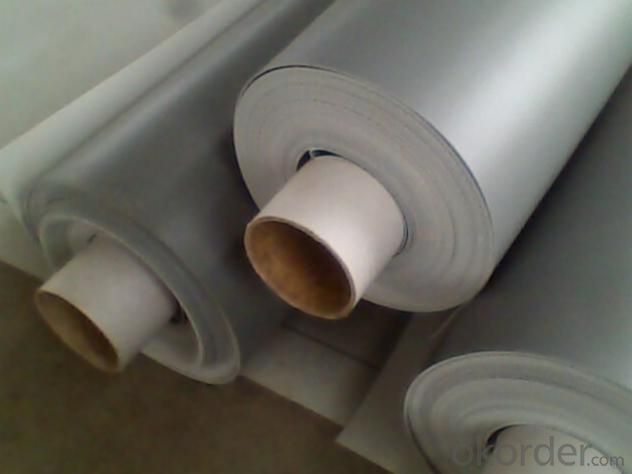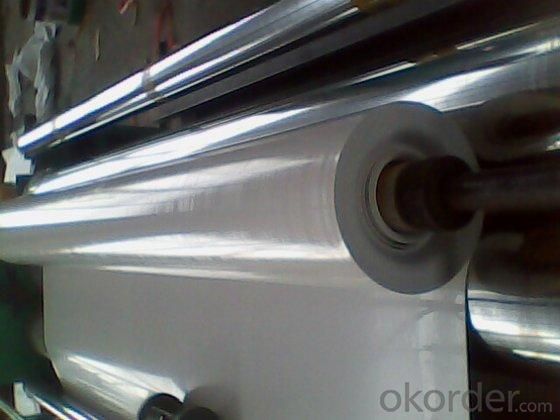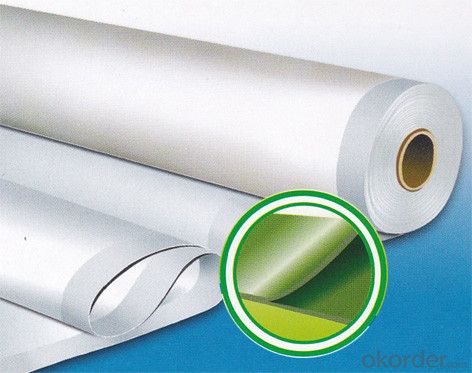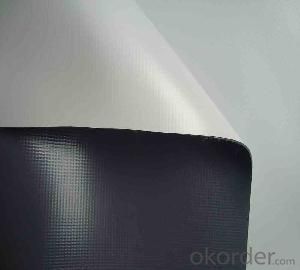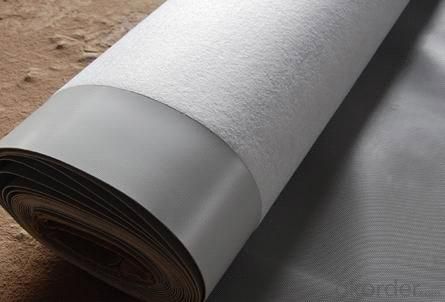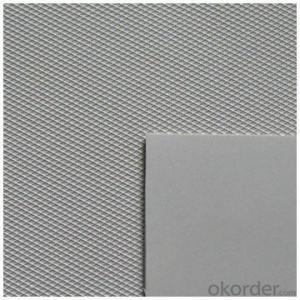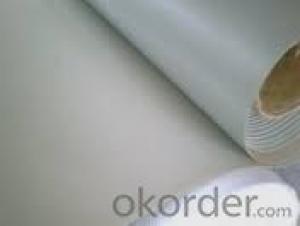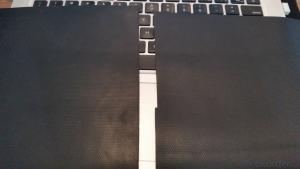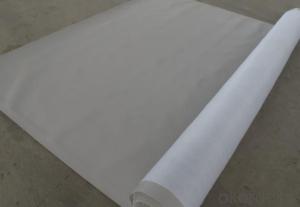PVC Waterproof Membrane in 1.0mm Thickness
- Loading Port:
- Shanghai
- Payment Terms:
- TT OR LC
- Min Order Qty:
- 20000 m²
- Supply Capability:
- 5000000 m²/month
OKorder Service Pledge
OKorder Financial Service
You Might Also Like
PVC Waterproof Membrane in 1.0mm Thickness
Product Description of PVC Waterproof Membrane in 1.0mm Thickness:
PVC Membrane Waterproof /Waterproofing membrane For Roof is a new polymer waterproof membrane. The PVC Membrane Waterproof /Waterproofing membrane For Roof raw material is polyvinyl chloride resin, mixed with plasticizer, filler, antioxygen, ultraviolet absorber and other auxiliaries.
Thickness: 1.2mm/1.5mm/1.8mm/2.0mm
Width:2050mm
Length:20m( Special specifications can be customized)
Size: 2.05mx20m
Color: white/grey, or any other colors.
Features of PVC Waterproof Membrane in 1.0mm Thickness:
1. Excellent aging resistance. Service life of roofing material is over 20 years; service life of underground material is over 50 years.
2. Root resistant penetration, specially used on planting roofings.
3. Welding installation. Joints are solid and environment friendly, no pollution.
4. High tensile strength, good elongation and dimensional stability.
5. Good plasticity, easy and suitable for details installation.
6. Fireproof. Fire extinguished out of the ignition resource.
7. Surface is smooth, no fading and dirty resistant.
8. Width is over 2m. Construction wastage is small, more economical.
Classification of PVC Waterproof Membrane in 1.0mm Thickness:
1. N: Homogeneous PVC membrane
2. L: PVC membrane with fabric backing
3. W: Reinforced PVC membrane
Advantage of PVC Waterproof Membrane in 1.0mm Thickness:
1.) Mixing automation. Apply automatic temperature control automatic time control and automatic feed control.
2.) Extrusion equipment uses twin screw coextrusion. Screw temperature uses computer automatic temperature control system.
3.) Handpiece uses large width didhead extrusion equipment.
4.) Sophisticated three-roller calender equipment. The space between equiment is controlled by automation system.
Technical Data of PVC Waterproof Membrane in 1.0mm Thickness:
No. | Item | Model Ⅱ | |
1 | Tensile Strength Mpa ≥ | 12.0 | |
2 | Elongation at break% ≥ | 250 | |
3 | Shrinkage rate % ≤ | 2.0 | |
4 | Flexibility at low temperature | No crackle at -25oC | |
5 | Water tightness | Watertight | |
6 | Puncture resistance | Watertight | |
7 | Heat aging treatment | Appearance | Free from bubble, crack, cohesion and void |
Change rate of tensile strength % | +20oC | ||
Change rate of elongation at break | |||
Flexibility at low temperature | No crack at -20oC | ||
8 | Chemical corrosion resistance | Change rate of tensile strength % | +20 |
Change rate of elongation at break | |||
Flexibility at low temperature | No crack at -20oC | ||
9 | Artificial weathering | Change rate of tensile strength % | +20 |
Change rate of elongation at break | |||
Flexibility at low temperature | No crack at -20oC | ||
Application of PVC Waterproof Membrane in 1.0mm Thickness:
PVC waterproof membrane forms an effective barrier to liquid water or water vapor in the steel structure for industrial and civil engineering, underground engineering, such as subway, bridges , tunnel, water pools, shelter, grain depot, land filling and subwayProducts display.
Images of PVC Waterproof Membrane in 1.0mm Thickness:
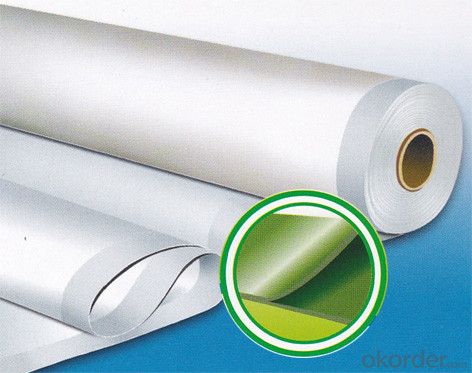
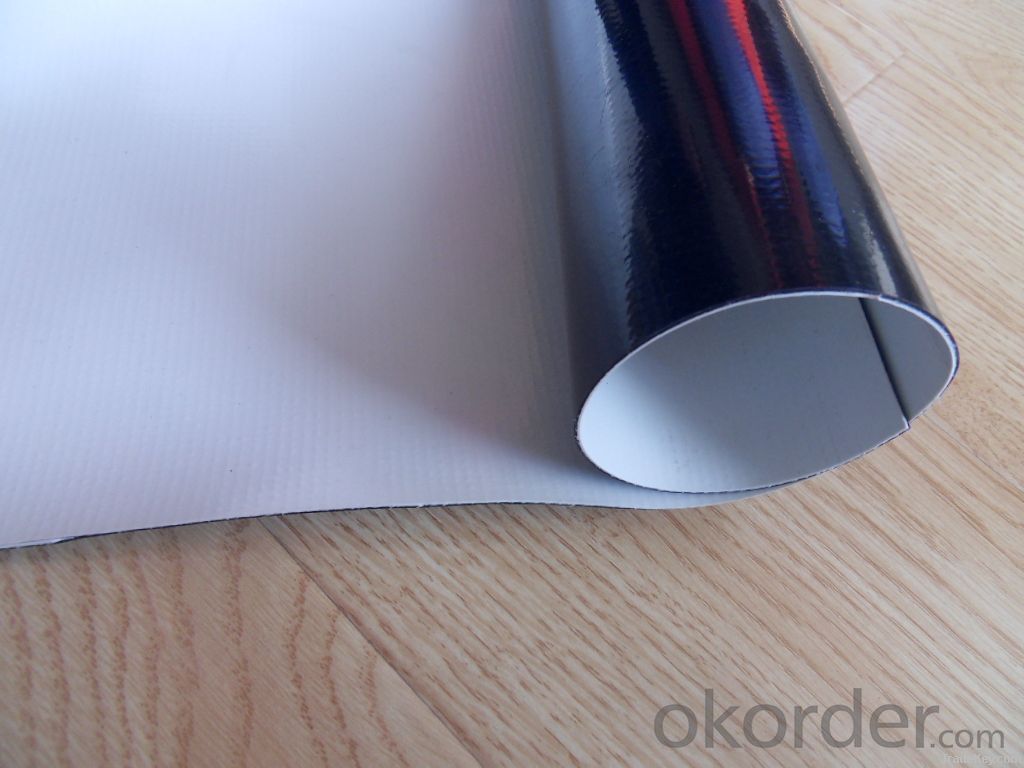
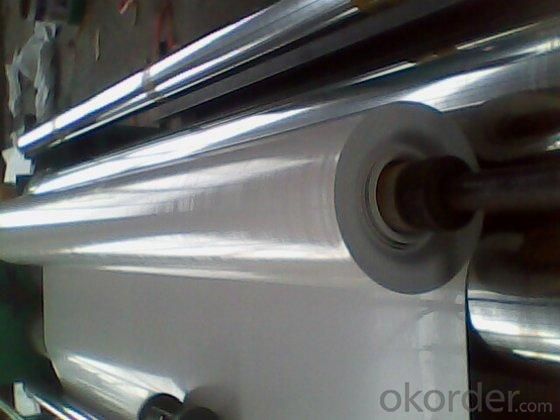
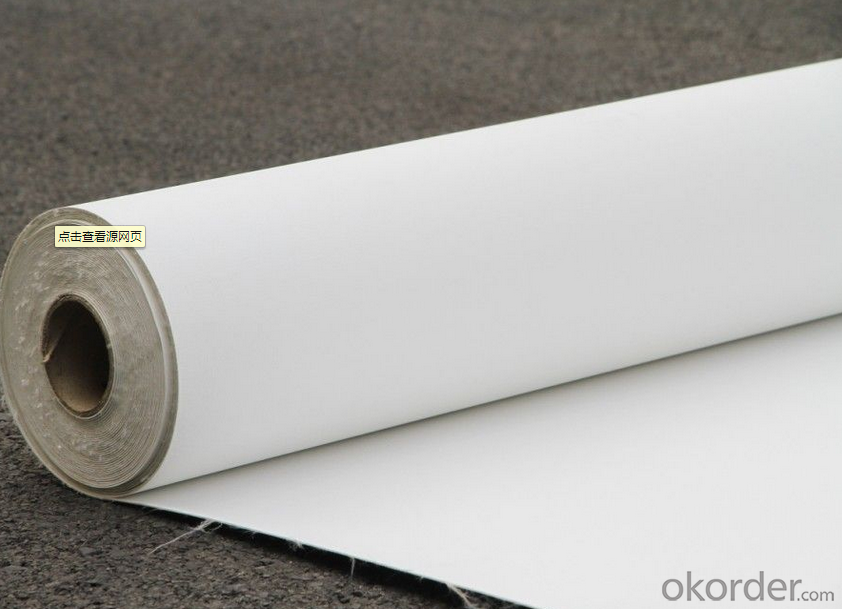
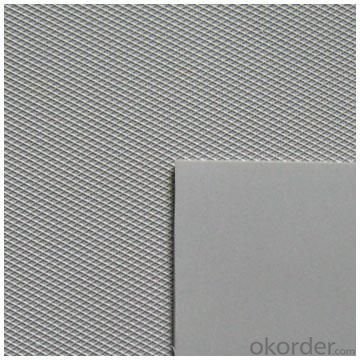
FAQ:
1. Can you produce 4m width?
Yes, no problem for us. We have four bases in China, largest one in this field.
2. How many quantity in one 20'' container for 1.2mm and 1.5mm?
480rolls, 11520m2 for 1.2mm and 400rolls, 9600m2 for 1.5mm
3. Can you provide free samples?
Yes, our samples are free, but express fees usually on buyer's account.
- Q: Are waterproofing membranes resistant to chlorine exposure?
- Waterproofing membranes can vary in their resistance to chlorine exposure. Some membranes are specifically designed to be resistant to chlorine and are commonly used in applications where chlorine exposure is expected, such as pool decks or water treatment facilities. These membranes are typically made with materials like PVC or TPO that have inherent resistance to chlorine and can withstand prolonged exposure without significant degradation. However, it is important to note that not all waterproofing membranes are chlorine-resistant. Some membranes, particularly those made with materials like EPDM or bitumen, may not be as resistant to chlorine and may experience deterioration or damage when exposed to chlorine for extended periods. To ensure the longevity and effectiveness of a waterproofing membrane in a chlorine-rich environment, it is crucial to select a membrane that is specifically designed and tested for chlorine resistance. Consulting with a waterproofing professional or manufacturer can help determine the most suitable membrane for the specific chlorine exposure conditions.
- Q: Can a waterproofing membrane be used in tunnels or underground structures?
- Absolutely, tunnels or underground structures can definitely benefit from the utilization of a waterproofing membrane. In fact, it is highly advisable to employ a waterproofing membrane in such environments to prevent any water-related harm or leakage. Due to their positioning and exposure to underground water sources, tunnels and underground structures are particularly susceptible to water infiltration. By acting as a protective barrier, the waterproofing membrane effectively prevents water from seeping into the tunnels or structures, thus averting potential structural damage or compromising the safety of the area. Its ability to establish a watertight seal ensures that the interior remains dry and devoid of any water-related problems such as mold growth, material corrosion, or degradation. Moreover, waterproofing membranes are specifically engineered to withstand the unique challenges posed by underground environments, including high water pressure, ground movement, and exposure to harsh chemicals. Hence, employing a waterproofing membrane is not only feasible but also indispensable for preserving the durability and integrity of tunnels and underground structures.
- Q: Can a waterproofing membrane be used for tunnels or subway systems?
- Yes, a waterproofing membrane can be used for tunnels or subway systems. Tunnels and subway systems are often subjected to water infiltration due to the surrounding soil conditions or groundwater levels. To prevent water from entering these underground structures, a waterproofing membrane is commonly applied. This membrane acts as a barrier, preventing water from seeping into the tunnels or subway systems. It is typically installed on the exterior surface of the tunnel walls and roof, creating a watertight seal. This helps to prevent corrosion, decay, and damage to the structural elements of the tunnels and ensures the safety and longevity of these underground infrastructures.
- Q: Can a waterproofing membrane be used on concrete block surfaces?
- Concrete block surfaces can indeed benefit from the application of a waterproofing membrane. These membranes are specifically designed to act as a shield against moisture and water infiltration, which makes them a popular choice for safeguarding concrete block surfaces against water-related harm and leaks. To achieve this, the membranes are either applied as a liquid or in sheet form, bonding to the surface of the concrete blocks and forming a protective layer that prevents water from seeping through. By reducing the risks of water damage, mold growth, and deterioration, the lifespan of the concrete blocks can be extended with the help of this waterproofing membrane. It is crucial to select a membrane that is specifically tailored for concrete block surfaces, and to follow the manufacturer's instructions carefully during installation to ensure optimal results.
- Q: Are waterproofing membranes suitable for commercial applications?
- Indeed, waterproofing membranes prove to be a fitting choice for commercial applications. Specifically designed to safeguard buildings, structures, and surfaces from water infiltration, moisture damage, and similar issues, waterproofing membranes are frequently employed in diverse commercial scenarios such as roofs, basements, underground parking garages, and exterior walls. Commercial structures face a wide array of weather conditions and water sources, encompassing rainfall, snowfall, and groundwater. Waterproofing membranes serve as a dependable barrier, effectively preventing water penetration and averting costly water-related harm. Furthermore, they serve as a vapor barrier, mitigating moisture accumulation and condensation within the building envelope, which may otherwise lead to mold growth and structural decay. Waterproofing membranes are obtainable in various materials including bitumen, modified bitumen, EPDM, PVC, and TPO. Each material boasts distinct advantages and characteristics, allowing for flexibility in choosing the most appropriate option for specific commercial applications. They can be applied as liquid coatings, sheets, or panels, providing versatility in terms of installation methods to accommodate diverse building designs and requirements. Moreover, waterproofing membranes can be tailored to cater to specific commercial needs such as fire resistance, UV protection, and durability. This renders them highly effective in safeguarding commercial properties that may be subjected to heavy foot traffic, mechanical equipment, or other potential sources of damage. To summarize, waterproofing membranes prove to be an exceptionally suitable solution for commercial applications. They offer reliable protection against water infiltration, moisture damage, and related issues, ensuring the longevity and structural soundness of commercial buildings. Their versatility, customizable options, and ability to withstand various weather conditions make them an outstanding choice for commercial waterproofing requirements.
- Q: Can waterproofing membranes be used on shower walls?
- Indeed, waterproofing membranes are suitable for application on shower walls. They play a crucial role in shower construction by preventing water leakage and safeguarding adjacent areas from potential harm. These membranes act as a barrier, effectively blocking water infiltration into the shower's structural components. Typically, they are installed behind the tile or other wall coverings, serving as an additional protective layer. Designed to be pliable, long-lasting, and moisture-resistant, waterproofing membranes guarantee the preservation of watertight shower walls and safeguard against any water-related harm.
- Q: How does a waterproofing membrane handle movement joints or cracks?
- A waterproofing membrane is designed to accommodate movement joints or cracks by providing flexibility and elasticity. It can stretch and contract to accommodate the movement of the substrate, ensuring that water does not penetrate through the joints or cracks. Additionally, some waterproofing membranes have the ability to self-heal small cracks, further enhancing their effectiveness in handling movement joints or cracks.
- Q: Can a waterproofing membrane be used for data centers?
- Yes, a waterproofing membrane can be used for data centers. Waterproofing membranes are commonly used in construction to prevent water intrusion and leakage. In data centers, where protection against water damage is crucial for sensitive equipment and infrastructure, a waterproofing membrane can provide an additional layer of protection to safeguard against potential water leaks or flooding.
- Q: Are waterproofing membranes suitable for residential applications?
- Yes, waterproofing membranes are suitable for residential applications. They are commonly used in various areas of residential construction, such as basements, foundations, roofs, bathrooms, and balconies, to prevent water penetration and protect the building structure from moisture damage. Waterproofing membranes provide a barrier against water, preventing it from seeping into the structure and causing issues like mold, rot, or structural damage. These membranes are typically made of materials like bitumen, PVC, EPDM, or polyurethane, which are highly effective in repelling water. In residential constructions, waterproofing membranes are installed during the building process or as a part of renovation projects. They can be applied as a liquid coating or in the form of sheets that are laid down and adhered to the surface. These membranes create a seamless and durable barrier that can withstand the test of time. Additionally, waterproofing membranes offer various benefits for residential applications. They help maintain a dry and comfortable living environment by preventing water leaks and dampness. This, in turn, protects the integrity of the building materials, prolongs the lifespan of the structure, and reduces the risk of costly repairs. Furthermore, waterproofing membranes can also enhance energy efficiency by reducing moisture-related heat loss or gain. By preventing water infiltration, they help maintain consistent temperatures inside the house, resulting in lower energy consumption and utility bills. Overall, waterproofing membranes are an excellent choice for residential applications. They provide reliable protection against water damage, improve the longevity of the structure, and contribute to a healthier and more energy-efficient living environment.
- Q: Does a waterproofing membrane require any specific preparation of the substrate before installation?
- Preparation of the substrate is essential for the installation of a waterproofing membrane. Before applying the membrane, the surface on which it will be placed must be thoroughly cleaned, dried, and devoid of any contaminants or debris that could impede its adhesion. This process typically entails the removal of loose materials, such as old paint or sealants, and the leveling of any uneven surfaces. Furthermore, it may be necessary to repair any cracks or damage in the substrate to guarantee a proper and efficient installation of the waterproofing membrane. By following the recommended preparatory procedures, one can ensure that the membrane performs optimally and exhibits remarkable durability, effectively safeguarding the underlying structure against water infiltration.
Send your message to us
PVC Waterproof Membrane in 1.0mm Thickness
- Loading Port:
- Shanghai
- Payment Terms:
- TT OR LC
- Min Order Qty:
- 20000 m²
- Supply Capability:
- 5000000 m²/month
OKorder Service Pledge
OKorder Financial Service
Similar products
Hot products
Hot Searches
Related keywords
